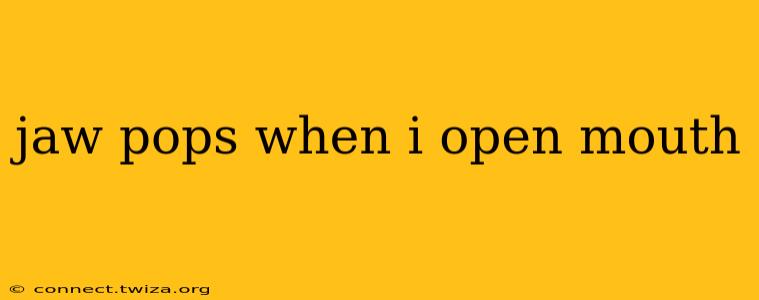Experiencing a popping sound in your jaw when you open your mouth can be unsettling. This common issue, often associated with temporomandibular joint (TMJ) disorders, can range from a minor annoyance to a significant source of pain and discomfort. Understanding the underlying causes and potential treatments is crucial for managing this condition effectively.
What Causes a Popping Jaw?
The most frequent culprit behind a popping jaw is a problem with your temporomandibular joint (TMJ), the hinge connecting your jaw to your skull. Several factors can contribute to this:
-
Temporomandibular Joint Disorder (TMJ): This is the most common cause. TMJ disorders encompass a range of conditions affecting the TMJ, its surrounding muscles, and ligaments. Dislocation of the articular disc, a cartilage cushion within the joint, is a frequent cause of popping. The disc might slip out of place during jaw movement, creating the popping sound.
-
Ligament Laxity: Loose ligaments in the TMJ can allow for excessive movement, leading to the jaw popping or clicking.
-
Arthritis: Degenerative arthritis in the TMJ can cause inflammation and damage to the joint cartilage, resulting in popping and clicking sounds.
-
Jaw Injury: A previous injury to the jaw, even a seemingly minor one, can contribute to instability and popping.
-
Muscle Spasms: Tight or spasming jaw muscles can sometimes cause a popping sensation.
-
Inflammatory Conditions: Certain inflammatory conditions can affect the TMJ, leading to pain, popping, and clicking.
Why Does My Jaw Pop and Click When I Open My Mouth Wide?
Opening your mouth wide exacerbates the movement of the TMJ components. If there's a disc displacement or ligament laxity, the wider the opening, the more likely it is that the structures will shift, causing a more pronounced pop or click. The increased stress on the already compromised joint intensifies the audible and sometimes painful sound.
What Does it Mean When Your Jaw Pops But Doesn't Hurt?
While a popping jaw is often associated with pain, it doesn't always accompany discomfort. A painless popping sound might indicate a less severe condition, perhaps simply loose ligaments or minor disc displacement. However, it's still essential to consult a healthcare professional to rule out any underlying issues that might worsen over time. Ignoring a painless popping sound doesn't make the problem disappear; it merely delays diagnosis and potential treatment.
How Do You Fix a Popping Jaw?
Treatment for a popping jaw depends on the underlying cause and severity of symptoms. Options include:
-
Conservative Treatment: This often involves managing the problem with rest, ice packs, over-the-counter pain relievers (like ibuprofen or naproxen), and soft food diet. Physical therapy, including exercises to improve jaw range of motion and muscle strength, may also be recommended.
-
Splints or Mouthguards: Custom-made splints or mouthguards can help stabilize the jaw joint and reduce stress on the TMJ.
-
Medication: In some cases, doctors might prescribe medication to reduce pain and inflammation.
-
Injections: Corticosteroid injections directly into the TMJ can help reduce inflammation and pain.
-
Surgery: Surgery is typically considered only as a last resort when conservative measures have failed to provide relief.
Can a Popping Jaw Heal on Its Own?
In some cases, particularly with minor instances of ligament laxity or mild disc displacement, a popping jaw might resolve itself with rest and conservative measures. However, it's crucial to seek professional medical advice to determine the cause and appropriate treatment. Ignoring the issue could lead to chronic pain, limited jaw movement, and other complications.
When Should I See a Doctor About My Popping Jaw?
You should consult a doctor or dentist specializing in TMJ disorders if:
- The popping is accompanied by significant pain or discomfort.
- Your jaw is locking or catching.
- You experience headaches, earaches, or neck pain related to your jaw.
- The popping is getting progressively worse.
- You have difficulty opening or closing your mouth fully.
Addressing a popping jaw promptly is vital for preventing long-term problems. Early diagnosis and treatment can significantly improve outcomes and prevent the condition from becoming chronic. Remember to always consult a healthcare professional for diagnosis and treatment recommendations tailored to your specific situation.
